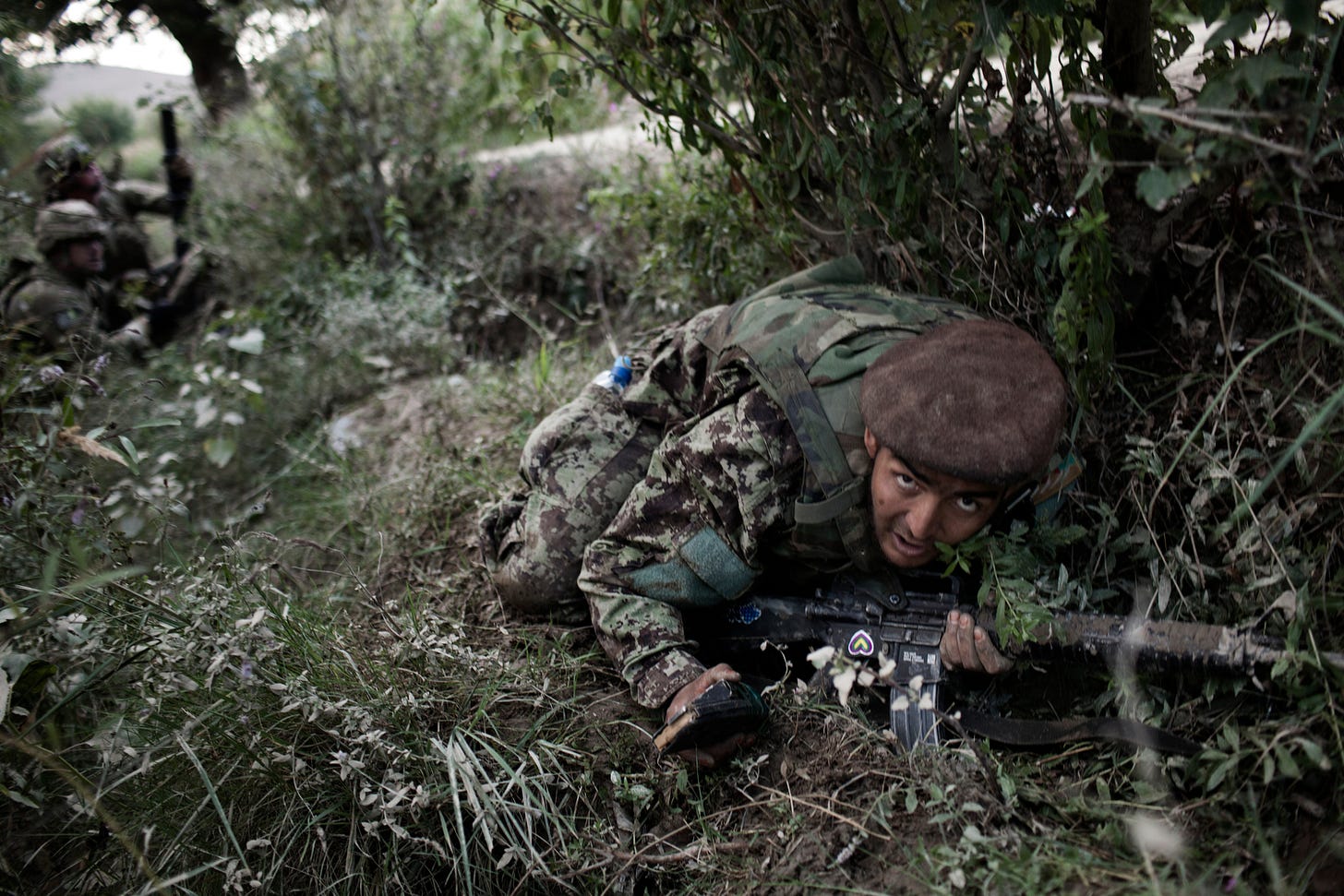The Ambush
The last moments in the life of an American soldier in Afghanistan
Since I published this interview, on Wednesday with Kabul-based photographer Kiana Hayeri, three more major cities in Afghanistan have fallen to the Taliban, which now holds more ground in the country than it did at the start of 2001.
In 2011, for the tenth anniversary of 9/11, I embedded with the U.S. Army on assignment for Time magazine. There had been a troop surge under Obama in 2009, and there was still some hope in the country. I wanted to be on the ground for what, at the time, felt like a momentous milestone in the war. I kept a diary during this time, and I wrote up the following story during this experience.
After I was involved in the ambush I describe below, I stopped doing military embeds. Watching this soldier live out his last moments affected me deeply, and I became disillusioned with my work there. What were American soldiers doing in this far corner of the world? Was it worth dying for?
When I read this diary entry now, it’s hard to understand what it was all for. Under the military embed rules, Time never published the photographs because the next of kin didn’t sign off on their release. The photos included here are from the scene, but the pictures of the wounded soldier have been withheld.

I like to think I can feel war when it's coming. It takes on a presence in the smallest of details: a bird, a discarded piece of rubbish, or the look in somebody's eye develops a deeper layer of meaning. I don't know how much of this is real and how much of it is imagined. But, after a dramatic event, it's easy, maybe even natural, to look back and feel as though you knew that something was about to happen.
On September 10, 2011, as I stepped beyond the wire with American soldiers from the 1st Platoon, Charlie Company, 2-28 Infantry of the 172nd Infantry Brigade, I knew—we all knew—that something awaited us.
We were patrolling out of Combat Operations Post Margah, a makeshift base on a ragged piece of earth near the border with Pakistan in Afghanistan's eastern Paktika Province. The company’s 1st sergeant addressed the young men standing before him in fatigues and body armor in the pre-patrol brief. "If they shoot, they just tell us where the fuck they are. That means we fucking kill 'em".
Most of the soldiers didn't know which province we were in, let alone understand the complex tribal, ideological, and political affiliations at play along the border. But it was the eve of the 10th anniversary of 9/11, and although this was a routine patrol, with no greater ambition than to be a show of force, the men wanted a fight.
We avoided the paths because of the threat posed by IEDs, and instead, trudged across uncharted terrain, slate cracking under the weight of our body armor, down into the valley of Towr Wurskay village, a slice of greenery amid the moonscape of desolate mountains.
Charlie Company was fresh from its home base in Germany, and the soldiers patrolled like it, bunched together with their guns down. For many, this was their first deployment to Afghanistan and they hadn't been in kinetic combat just yet.
As the sun lowered in the sky, the orange glow of the afternoon gave way to hues of blue and green. We gathered on the bank of the river that gave life to the valley. The company captain needed to decide whether we should cross the 200m wide dry riverbed, thus leaving ourselves exposed, or turn back and make our way through the village, running the risk of being ambushed.

As the captain deliberated, gunfire cracked through the air, splintering our thin cover of trees. Like the soldiers around me, I dropped to the wet, hard ground. The sound was so loud that I couldn't tell where the bullets were coming from or going to. As I looked around and lifted my camera in the air to take pictures, I could see Afghan National Army troops, who had shadowed the patrol, spraying bullets over the heads of the Americans I lay with. I wondered whether their bullets might kill one of us before the insurgents had a chance to.
The firing was intense, but it wasn't protracted. As I gathered my senses, I noticed that a soldier had been hit five meters away from me. I hadn't had the chance to talk to Staff Sergeant Daniel Quintana, but I'd photographed him 10 minutes before we'd embarked on the patrol. He had been sitting on a lounge chair in full body armor, watching TV and looking happy and relaxed. Now he looked lifeless.
Mortars from the nearby base started to rain from the sky; the Americans retaliated with a barrage of ammunition from both ground and air. Finally, after a few minutes, the fighting lulled.
As the remaining daylight faded, army medics worked tirelessly on Quintana, keeping him alive until the Black Hawk evacuation helicopter touched down in the dark and lifted him up into the night. But it was to no avail. He left behind a pregnant wife and a child.
Four months later, Specialist Keith Benson, one of the medics who tried so hard to keep Quintana alive, shot himself with his 9mm pistol in his plywood room on the very base we had patrolled from on September 10.



Adam, your outlook on life is amazing. Thanks for writing this one
War sucks!